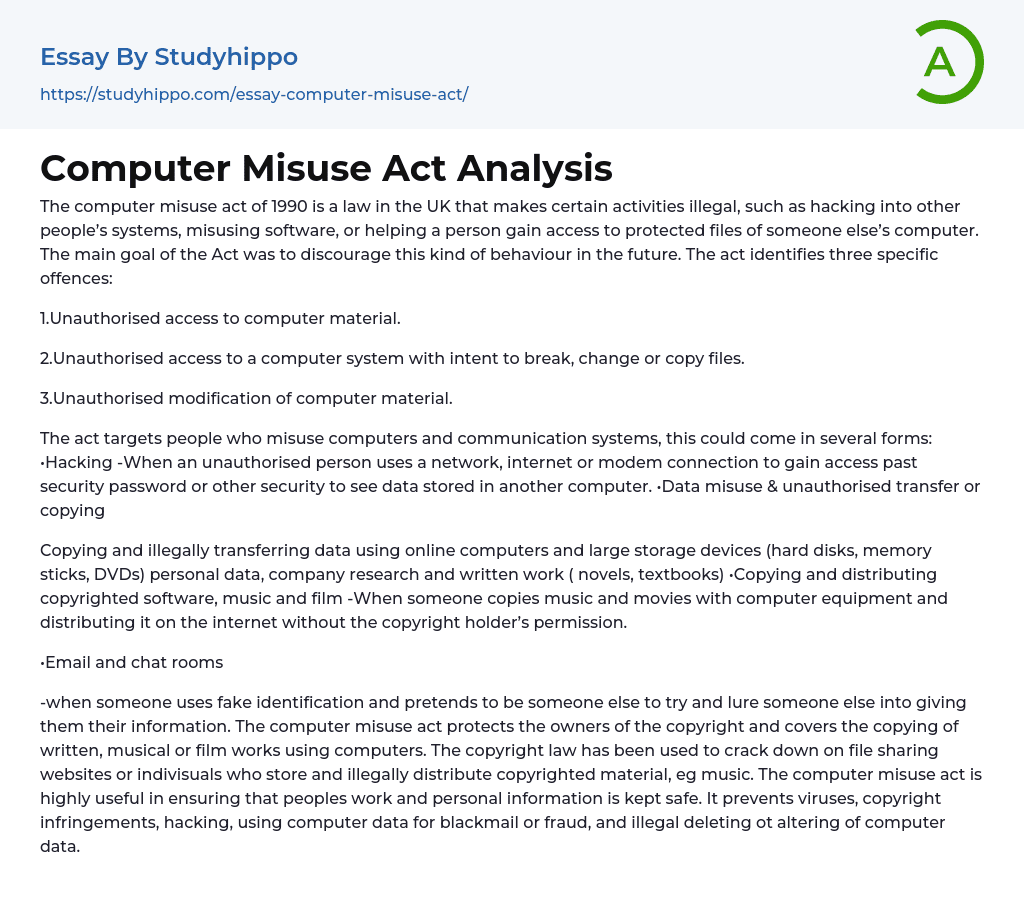The UK enacted the Computer Misuse Act in 1990 to outlaw certain activities, including hacking into others' systems, software misuse, and assisting someone in accessing others' protected files. The Act's primary aim was to deter such actions in the future. It specifically highlights three misdemeanors:
1. Unauthorized entry into computer data.
2.Attempting to access a computer system without permission with the objective to modify, copy, or damage files.
3.Illegal alteration of computer content.
This legislation aims to penalize the improper use of computer systems and communication platforms, which could manifest in various ways: •Unauthorized intrusion - This involves individuals without authorization utilizing a network, internet or modem connection to bypass security measures such as passwords to access data on another computer. •Widespread misuse and unauthorized dissemination or copying
Copying and dishonestly transmitting d
...ata via online devices and extensive storage equipment (hard drives, flash drives, DVDs) like personal information, corporate studies, and literary works (novels, textbooks) •Copying and distributing copyrighted content, such as music and films - This occurs when an individual duplicates music and movies using computing devices and circulates them on the internet without the consent of the copyright owner.
•Email and chat rooms
-when an individual uses false identity or pretends to be someone else to coax another person into revealing their personal details. The Computer Misuse Act safeguards the copyright owners and extends its coverage on the replication of written, musical, or film works using computers. This copyright law has been effectively implemented to tackle the issue of file sharing websites or individuals that hoard and unlawfully disseminate copyrighted content, like music. The Computer Misuse Act plays a crucial role in ensuring that people's wor
and private information stay protected. It curbs the spread of computer viruses, copyright violations, hacking, using computer data for fraudulent activities or blackmail, as well as unlawful deletion or modification of computer data.
- Computer File essays
- Desktop Computer essays
- Servers essays
- Business Law essays
- Contract essays
- Consumer Protection essays
- Property essays
- Ownership essays
- Agreement essays
- Common Law essays
- Contract Law essays
- Justice essays
- Security essays
- Tort Law essays
- United States Constitution essays
- Crime essays
- Lawsuit essays
- Treaty essays
- Family Law essays
- Marijuana Legalization essays
- Constitution essays
- War on Drugs essays
- Court essays
- Jury essays
- Police essays
- Protection essays
- Community Policing essays
- Criminal Law essays
- Judge essays
- Lawyer essays
- Employment Law essays
- Copyright Infringement essays
- Injustice essays
- Intellectual Property essays
- Breach Of Contract essays
- Jurisprudence essays
- Social Injustice essays
- Juvenile Justice essays
- Internet Privacy essays
- Cyber Security essays
- Bill Of Rights essays
- Civil Liberties essays
- First Amendment To The United States Constitution essays
- Fourth Amendment To The United States Constitution essays
- Second amendment essays
- Animal Cruelty essays
- Law Enforcement essays
- Juvenile Justice System essays
- Surveillance essays
- Forensic Science essays




